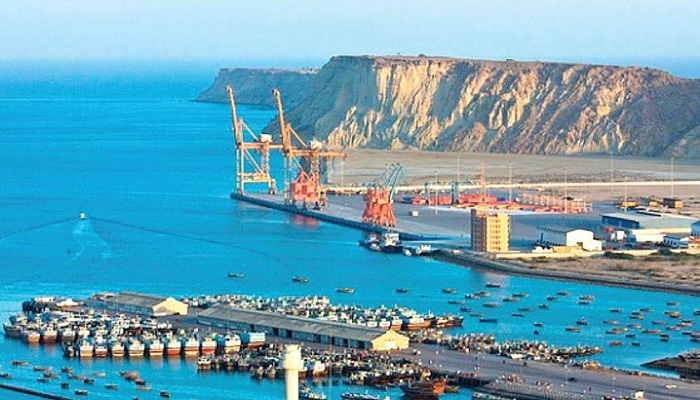Pakistan faces elevated external pressures on CPEC imports
KARACHI: Ratings agency Moody’s on Friday said Pakistan is facing elevated external pressures stemming from strong domestic demand and capital-import heavy investments related to the China-Pakistan Economic Corridor.
“We expect a current account deficit of 4.8 percent of GDP this year,” Moody’s Investors Service said in a research report.
The current account deficit was recorded at $18 billion or 5.7 percent of GDP in the last fiscal year of 2017/18 compared to $12.6 billion or 4.1 percent of GDP in the previous fiscal year. In July, current account deficit continued to swell year-on-year, up 13.87 percent to $2.2 billion, mainly due to monthly trade deficit of $3.192 billion.
The central bank’s foreign exchange reserved fell to $10 billion in June from $16.1 billion a year earlier – not enough to cover two months’ worth of imports. Economists estimated a need of $28 billion this fiscal year to make debt repayments.
Moody’s said while reserve coverage of external debt repayments remains adequate, “we expect that coverage to weaken”. “Unless capital inflows increase substantially, possibly through and in combination with an IMF (International Monetary Fund) program, we see elevated risk of a further erosion in foreign exchange reserves.”
The ratings agency said the country’s external vulnerability indicator that measures the ratio of external debt payments due over the next year to foreign exchange reserves is around 85 percent.
“Around one-third of government debt is denominated in foreign currency,” it said. “Pakistan's gross borrowing requirements are among the highest among rated sovereigns at around 27-30 percent of GDP. This is driven by persistent fiscal deficits and the government’s reliance on short-term debt, with an average maturity of 3.8 years.”
Moody’s said Pakistan is not a major recipient of volatile capital inflows. Local currency depreciation could, however, raise inflation and prompt additional domestic rate hikes, which would pass through to borrowing costs and further weaken the government’s fragile fiscal position.
“We find that Pakistan’s debt affordability would weaken significantly from already low levels in the event of a sharp and sustained increase in the cost of debt.” Moody’s estimated Pakistan as one of the 15 countries in the world that experienced largest local currency fall against the dollar year to date.
Other countries included Argentina, Turkey, Russia, Brazil, South Africa, Sweden, Hungary, Tunisia, Poland, India, Kazakhstan, Uruguay, Botswana, and New Zealand. “From the sovereigns we identified as most vulnerable to an appreciation of the US dollar, Argentina and Pakistan’s currencies have experienced particularly marked falls against the dollar, of nearly 40 percent and around 10 percent year to date respectively,” Moody’s said. Most countries facing market pressures have twin current account and fiscal deficits.”
Moody’s has already changed the outlook on Pakistan’s rating to negative from stable and affirmed the B3 local and foreign currency long-term issuer and senior unsecured debt ratings. “The decision to change the outlook to negative is driven by heightened external vulnerability risk. Foreign exchange reserves have fallen to low levels and, absent significant capital inflows, will not be replenished over the next 12-18 months,” the ratings agency said in a statement in June.
“Low reserve adequacy threatens continued access to external financing at moderate costs, in turn potentially raising government liquidity risks.”
-
 Prevent Cancer With These Simple Lifestyle Changes
Prevent Cancer With These Simple Lifestyle Changes -
 Experts Reveal Keto Diet As Key To Treating Depression
Experts Reveal Keto Diet As Key To Treating Depression -
 Inter Miami Vs Barcelona SC Recap As Messi Shines With Goal And Assist
Inter Miami Vs Barcelona SC Recap As Messi Shines With Goal And Assist -
 David Beckham Pays Tribute To Estranged Son Brooklyn Amid Ongoing Family Rift
David Beckham Pays Tribute To Estranged Son Brooklyn Amid Ongoing Family Rift -
 Jailton Almeida Speaks Out After UFC Controversy And Short Notice Fight Booking
Jailton Almeida Speaks Out After UFC Controversy And Short Notice Fight Booking -
 Extreme Cold Warning Issued As Blizzard Hits Southern Ontario Including Toronto
Extreme Cold Warning Issued As Blizzard Hits Southern Ontario Including Toronto -
 Lana Del Rey Announces New Single Co-written With Husband Jeremy Dufrene
Lana Del Rey Announces New Single Co-written With Husband Jeremy Dufrene -
 Ukraine-Russia Talks Heat Up As Zelenskyy Warns Of US Pressure Before Elections
Ukraine-Russia Talks Heat Up As Zelenskyy Warns Of US Pressure Before Elections -
 Lil Nas X Spotted Buying Used Refrigerator After Backlash Over Nude Public Meltdown
Lil Nas X Spotted Buying Used Refrigerator After Backlash Over Nude Public Meltdown -
 Caleb McLaughlin Shares His Resume For This Major Role
Caleb McLaughlin Shares His Resume For This Major Role -
 King Charles Carries With ‘dignity’ As Andrew Lets Down
King Charles Carries With ‘dignity’ As Andrew Lets Down -
 Brooklyn Beckham Covers Up More Tattoos Linked To His Family Amid Rift
Brooklyn Beckham Covers Up More Tattoos Linked To His Family Amid Rift -
 Shamed Andrew Agreed To ‘go Quietly’ If King Protects Daughters
Shamed Andrew Agreed To ‘go Quietly’ If King Protects Daughters -
 Candace Cameron Bure Says She’s Supporting Lori Loughlin After Separation From Mossimo Giannulli
Candace Cameron Bure Says She’s Supporting Lori Loughlin After Separation From Mossimo Giannulli -
 Princess Beatrice, Eugenie Are ‘not Innocent’ In Epstein Drama
Princess Beatrice, Eugenie Are ‘not Innocent’ In Epstein Drama -
 Reese Witherspoon Goes 'boss' Mode On 'Legally Blonde' Prequel
Reese Witherspoon Goes 'boss' Mode On 'Legally Blonde' Prequel




